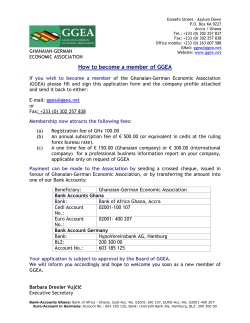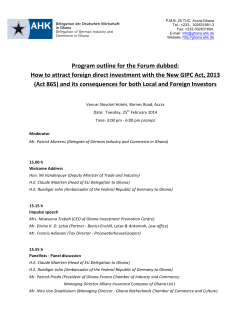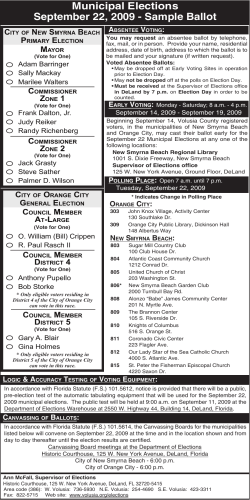
Downloar Report - The Ghana Center for Democratic Development
Coalition of Domestic Election Observers Ensuring Peaceful and Credible Elections FOR IMMEDIATE RELEASE Advisory Board Prof. Miranda Greenstreet, Co-Chair Justice V.C.R.A.C. Crabbe, Co-Chair Prof. E. Gyimah-Boadi (CDD-Ghana) Rev. Dr. Fred Deegbe (GCC) Mr. Nicholas K. Akyire (GNAT) Sheik Arimiyawo Shaibu (IEU) Mr. Eric Carbonu (NAGRAT) Mad. Augusta Sena Gabianu Mr. Kofi Quantson Mr. Frank W. K. Beecham (GBA) Mr. Alexander W. Bankole(GFD) Mr. IsaacYanney (TUC) Dr. Kwesi Aning Mrs. Florence Dennis Member Organizations Ghana Trades Union Congress Amnesty International Ghana Bar Association Ghana Journalists Association Ghana National Association of Teachers National Association of Graduate Teachers Christian Council of Ghana February 2, 2015 Enhancing Citizen Participation in the 2015 Local Government/District Assembly Elections: Deepening Ghana’s Decentralization Process Statement on the Pre-Election Environment Observation for January, 2015 Introduction The Coalition of Domestic Election Observers (CODEO) is pleased to release its third pre-election environment observation statement on the 2015 District Assembly election. The pre-election observation exercise forms part of CODEO’s comprehensive project to observe the impending district assembly and unit committee elections. The report captures observations made by CODEO’s 86 long term pre-election observers and peer educators (all women) during the month of January. CODEO observers are deployed to 86 purposefully selected districts in all ten regions of the country (see appendix A below for the list of districts). CODEO’s pre-election observers submit observation reports every fortnightly to CODEO’s secretariat in Accra. Federation of Muslim Councils Ghana Federation of the Disabled Ghana Integrity Initiative Int. Federation of Women Lawyers Legal Resources Center Women in Law and Development in Africa Ghana Muslim Mission Ghana Muslim Academy Ghana Pentecostal & Charismatic Council Center for the Development of People National Network of Local Civic Unions Regional Council for Islamic Education National Union of Ghana Students Ghana Registered Midwives Association Islamic Council for Development & Humanitarian Services Ghana Muslim Mission Ghana National Association of Teachers Ghana Registered Midwives Association Ghana Registered Nurses Association International Association for the Advancement of Women in Africa Ghana Medical Association Center for Human Rights and Advanced Legal Research Office of the National Chief Imam Hedge-Ghana Youth Bridge Foundation Ghana Institution of Surveyors University Teachers Association of Ghana Junior Chamber Int.-Dansoman Association of Ghana Industries Churches Civil and Local Government Staff Association, Ghana Council of Independent Ahmadiyya Muslim Mission, Ghana Ghana Center for Democratic Development Secretariat: 95 Nortei Ababio Loop, North Airport Residential, Accra [E]: LG404 Legon, ACCRA +233-302 784293-4/776142 Fax: 233-302 763029 Summary of Findings The Electoral Commission (EC) has begun the training of its temporary staff across the country for the March 3rd district and unit committee elections; The EC completed the transfer of votes and the replacement of lost voter ID cards; The EC displayed the names and details of qualified aspirants for the checking of any anomalies; The National Commission for Civic Education (NCCE) continued with its education on local governance and sensitization of women and Persons with Disability (PWDs) to stand and be voted for; Prospective Aspirants continued with their campaign for votes; There were no major visible activities by civil society organisations (CSOs) in support of local government elections in the various districts observed; Some individuals or group of individuals are engaged in the destruction of the posters of some aspirants; and Discreet political party intrusions were observed in the upcoming district assembly elections. Main Findings Activities by the Electoral Commission The Electoral commission during the period of observation replaced lost voter ID cards and transferred names of voters who wished to do so. The EC embarked on recruitment of its temporary officers for the upcoming exercise. The EC also displayed the names of aspirants to check their details: pictures and the corresponding electoral areas. The EC used various channels to reach out to the general public concerning the impending local level elections. The use of posters was very prominent in the Commission’s education and dissemination strategy. Our observers reported that radio announcements were also used to inform and educate the general public on the 2015 district elections. In electoral areas where there were no aspirants after the period of filing nominations ended in December 23rd, 2014, the EC reopened for nomination forms to be picked in only those areas. For instance, in the Amenfi West District in the Western Region, the EC reopened for qualified persons to file their nominations in the Akromato, Nkwantatwam, Oda and Hiamatuo electoral areas; and in the Amomaso and Osofu Kyere electoral areas in the Berekum District in the Brong-Ahafo region between 17th and 18th January, 2015. This followed after announcements and education about the need to participate in local level governance. NCCE and Civic Education CODEO observers reported that the NCCE adopted various medium of communication to educate and sensitise the general public before, during and after the local level elections. Community forums, radio announcements and discussions, posters, information vans amongst others were the means the NCCE used to pass on information to the public. The reports from CODEO observers indicated that the NCCE’s activities cut across the entire country. For example, in the Amenfi West district in the Western region, Mfantseman district in the Central region, Tain and Dormaa districts in the BrongAhafo region, Ga East district in the Greater Accra region, Ketu districts in the Volta region, and Asante Akim North district in the Ashanti region, among others, the NCCE took the populates through democracy education, especially the current Ghanaian democratic dispensation and the need for democracy to be practiced and entrenched at the local level. It further educated the community members on the roles and responsibilities of the Assemblyman and the unit committee member. . CODEO observers also reported that in Amenfi West and Ellembele districts in the Western region, Wa West district in Upper West region, and Bolgatanga district in the Upper East region, the NCCE, in collaboration with the EC, educated citizens on the importance for the youth, women and people with disabilities to participate and be part of the impending district level election since these groups of people constitute the majority of the Ghanaian population. The NCCE further sensitised the general public to vote for competent people who will help promote development in their areas. It emphasised the point that the district level elections is strictly nonpartisan. Election Campaign and activities of Candidates Following the publication of names and particulars of qualified candidates to contest the district and unit committee elections, CODEO observers reported that some candidates have stepped up their campaigning in their various electoral areas. The aspirants are conducting their campaign using the house to house method, pasting of new posters, holding meetings with congregants of various religious bodies and the market place, clean-up exercises, organising parties and in some cases radio programme. Contestants in Mpatapo, Osofo Kyere, Zongo, Kato, Amangoase Berekum electoral areas all in Berekum in the Brong Ahafo Region are engaged on a promise spree to the electorates. Some of the promises made include the construction of toilet, markets and roads, the provision of good and portable drinking water and street lights, organizing communal labour for community cleaning and ensuring the clearing of chocked gutters and refuse dumps, sustainable and all inclusive development and attending to the needs of women and children and PWDs through the provision of micro finance. Defacing of Campaign Posters Though the reports filed by CODEO observers generally point to a peaceful and violent free campaign, there are cases of some few faceless individuals who have been engaged in the act of destroying posters of some other aspirants. For instance, in the Kataraga electoral area in Sagnarigu District of Northern Region, a candidate complained of his posters being defaced or removed and in the Nkpor and East Akro electoral areas of Ledzokuku-Krowor District in the Greater Accra region, some candidates also complained about destruction of their campaign posters. Activities of Civil Society and Media CODEO observers reported seeing very little of CSOs activities in support of the district assembly elections during the month of January. Notwithstanding, in Binduri district in the Upper East region, a local CSO, the Community Development and Advocacy Center (CODAC), has been actively sensitizing the voters to elect women to represent them in the assembly. Further, CODEO peer educators in all the 86 selected districts have been working hard in educating women, the youth and persons with disabilities to present themselves for election. CODEO observers have also reported of low media coverage of the upcoming district assembly elections. However, Dormaa FM in the Dormaa Municipal Assembly has been educating public on the district assembly elections. Promotion of Issues Affecting Women, Youth and PWDs On the participation of women, youth and persons’ with disabilities in the elections, CODEO observers have reported that, these groups are actively participating in the upcoming district level elections. CODEO peer educators undertook in all the 86 selected project districts around the country sensitization programs to interest women, youth and PWDs to participate in the upcoming elections. CODEO observers have also reported that the NCCE and EC are also encouraging women and PWDs to present themselves for election in the impending local level elections. In spite of all these advocacy efforts, CODEO observers have reported of some derogatory remarks being passed by some people concerning women and PWDs as their representatives at the district level. In other cases, electoral areas where women and PWDs declared their intentions to stand for election, they are persuaded to stand down for another aspirant to go for the election. Undercover Political Party intrusion in the District Assembly elections CODEO observers reported instances of political party activities in the otherwise non-partisan nature of the district assembly elections. Contrary to the fact that the district assembly election is by law strictly non-partisan, CODEO observers reported seeing some political party executives and supporters campaigning for their preferred candidates. For instance, in the Ledzokuku-Krowor district in the Greater Accra region, party sympathizers of the two major political parties, the National Democratic Congress (NDC) and New Patriotic Party (NPP), were seen wearing party paraphernalia during clean up campaigns organised by aspirants. CODEO observers have reported that these incidents of clandestine political party intrusion have happened at Binduri in the Upper East Region; Ledzokkuku-Krowor in the Greater Accra Region; Lawra in the Upper West Region; Amenfi West in the Western Region; Dormaa in the Brong Ahafo Region; Asante Akim North in the Ashanti Region among others. Commendations CODEO commends the EC and NCCE, in particular, for their sensitization and education of the public to vote for marginalized groups like women and Persons with Disabilities in the impending district level elections. Recommendations In view of the above findings, CODEO recommends the following: The general lackluster attitude exhibited by CSOs towards the impending local level elections is worrying. CODEO urges CSOs, especially women and disabled groups, to show more interest in the impending district assembly elections by whipping the interest of women and PWDs to take up leadership positions. The NCCE should continue to arouse the interest of citizens, especially women and PWDs, to partake in the upcoming elections. Aspirants should desist from making promises that they cannot fulfill but just to woo voters. Political parties are cautioned to desist from their discreet involvement in the district assembly election as it is against the law. CODEO is reassured that the EC has taken steps to disqualify aspirants who flout the law with regards to political party affiliation. CODEO urges the EC to strictly apply the law on offending political parties as well to deter others from such acts. The media should hold more programmes concerning local governance to educate the public on the importance of the district and unity committee elections. Conclusion CODEO will continue to observe the pre-election environment and inform the general public through monthly press releases on activities and preparations of stakeholders towards the up-coming local government elections. CODEO’s comprehensive observation of the 2015 local government elections has been made possible with the generous support of the American people through the United States Agency for International Development (USAID), Ghana. Signed (For and on behalf of CODEO) Mr. Albert Kofi Arhin CODEO Coordinator CODEO Secretariat For further enquiries and information, please contact: The CODEO Coordinator, Mr. Albert K. Arhin on 0244746791/0208221068 or Rhoda Osei-Afful, CODEO Secretariat on 0244 350 266/ 0277 744 777 Appendix A: List of the 86 Project Districts Ekumfi, Awutu Senya, Abura-Asebu-Kwamankese, Mfantsiman, Assin North, Gomoa East, , Assin South, Komenda-Edina-Eguafo-Abirem, Ga West, Ga South, Ablekuma, Shai-Osudoku, Ga East, Madina La-Nkwantanan, Adenta, Ledzokuku-Krowor, Ketu South, Nkwanta South, North Tongue, Ketu North, Ho Municipal, Akatsi South, Keta Municipal, Hohoe, Kwahu South, Kwahu West, Akatsi South, Kwahu East, Birim South, Birim Central, New Juaben, Kwahu Afram Plains, Yilo Krobo, Asuogyaman, Suaman, Amansie Central, Adansi North, Offinso, Adansi South,.Asante Akim North, Obuasi, Bosome Freho, Sekyere East, .Afighya-Kwabre, Techiman,.Asunafo South,Bia West,Berekum, Asunafo North,Asutifi, Sene West, Tain, Dormaa, Pru, Wassa East, Sekyere Afram Plains,Prestea-Huni-Valley, Ellembele, Amenfi West, Nzema East, Jomoro, Shama, Wa West, Wa Municipal, Nadwoli,Lawra, Jirapa,Dafiema-Bussie-Issah, Wa East, East Gonja,Yendi, West Mamprusi, Central Gonja,Chereponi,Nanumba North, Sagnerigu, Tamale, Savelugu, Talensi-Tongo, Bolgatanga, Builsa, Bongo, Garu Tempane,Bawku Municipal,Binduri, and Kassena-Nankana West.
© Copyright 2026









